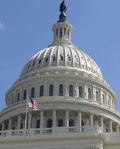
On May 8, President Trump released the Administration’s rescission request. The total will rescind $15.4 billion in budget authority, including $252 million in prior year balances of emergency funding appropriated in FY 2015 for the Ebola response. The White House’s proposed cut to USAID funding for Ebola response will continue even as the Democratic Republic of Congo (DRC) confirmed two new cases of the disease and declared an outbreak. Congress must pass the measure for the funds to be rescinded; the program funding is temporarily withheld for up to 45 legislative days while lawmakers consider the measure. The following day, House Republican leaders released the legislative text of the rescission package. The bill will bypass the committee process, setting up a floor vote as early as this week. Most Republicans have embraced the proposed cuts, particularly given that the Congressional Budget Office has stated that much of the rescission’s controversial cuts, like $7 billion from the Children’s Health Insurance Program (CHIP), targets already-expired funds that can’t be used.
On the Administration side, the President ceremonially swore in Secretary of State Mike Pompeo on May 2. The day before, Secretary Pompeo delivered brief remarks before State Department employees and announced that a hiring freeze on family members of employees posted overseas will be lifted. May 8, Rear Admiral Tim Ziemer, the head of global health security on the White House’s National Security Council, abruptly left the administration. The departure of Admiral Ziemer, the former PMI Coordinator, along with that of Homeland Security Adviser Tom Bossert last month, leaves the White House leadership responsible for global health unclear, at best.
House Appropriators continue to move bills for the FY 2019 budget but have not yet released text for the Labor Health and Human Services (LHHS) or the State and Foreign Operations (SFOPs) subcommittees. On April 18, the House Appropriations Committee held a hearing on the HHS Biodefense budget request for FY 2019. Witnesses included: Robert Kadlec, MD, MTM&H, MS, Assistant Secretary for Preparedness and Response, HHS; Anthony S. Fauci, MD, NIAID Director; and Stephen Redd, MD (RADM, USPHS), Director, Office of Public Health Preparedness and Response, CDC. During the hearing, the following major topics were discussed: antimicrobial resistance, biodefense contracting issues, emerging infectious diseases, funding for biodefense, preparedness efforts, research & development, biodefense relative to national security, the Strategic National Stockpile, and threats overall.
The Senate Appropriations Committee continues to hold hearings and may produce text of their bills in June. The Senate LHHS Subcommittee held a hearing on May 10 to discuss the Administration’s budget justification for HHS with testimony from Secretary Alex Azar. The Senate SFOPs Subcommittee examined the USAID budget request for FY 2019 on April 24. Republican Senators, including SFOPs Chair Lindsey Graham (R-SC), were critical of the Administration’s budget request, suggesting that the funding Congress appropriates will be close to last year’s figures. The hearing did not focus on Ambassador Green’s redesign plan.
The Senate HELP Committee leaders on April 26 released a bipartisan discussion draft to reauthorize the Pandemic and All-Hazards Preparedness Act. The bill reauthorizes the Biomedical Advanced Research and Development Authority, which helps advance medical countermeasures like vaccines and drugs. The bill also reauthorizes the BioShield special reserve fund and the strategic national stockpile. The draft includes a section dedicated to "strengthening" the existing Public Health Emergency Fund, which can be tapped quickly for urgent public health crises. The draft includes limited language on the importance of focusing on Emerging Infectious Diseases (EIDs) and mentions Antimicrobial Resistance (AMR) once but does not articulate a specific need to fund work in either of these areas.
The House Armed Services Committee began marking up their version of the FY 2019 National Defense Authorization Act (NDAA) on May 9 and passed the Committee on May 10. The annual Department of Defense authorization bill – particularly the section provided by the Subcommittee on Military Personnel – includes a few provisions related to global health, such as a DOD Action Plan for Countering Infectious Diseases and Global Health Engagement Organization Consolidation. The global health provisions were not included in the final Committee NDAA but may still be included on the floor of the House prior to passage.